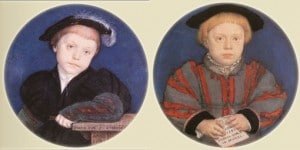
In the last outbreak, in summer, 1551, it claimed the lives of fifteen year-old Henry Brandon, 2nd Duke of Suffolk, and his fourteen year-old brother, Charles, 3rd Duke of Suffolk. These boys were the sons of the late Charles Brandon, 1st Duke of Suffolk, and his fourth wife Catherine Willoughby, Baroness Willoughby de Eresby and Duchess of Suffolk. They had been studying at St John’s College, Cambridge, when sweating sickness broke out in the town and so their mother, who had been staying in Kingston, a village just outside Cambridge, had the boys moved to the home of the Bishop of Lincoln in Buckden, Huntingdonshire.
While the boys were being moved to Buckden, the Duchess became ill. By the time she had recovered enough to travel to Buckden, Henry Brandon had died and Charles, who had succeeded his brother as Duke of Suffolk, was dying. Both boys died on the same day, 14th July 1551, and the Duchess must have been heartbroken.
The boys were buried privately at Buckden and then a special requiem mass, known as “A Month’s Mind”, was celebrated on 22nd September 1551. John Strype writes that “it was performed with two standards, two banners, great and large, ten bannerols, with divers coats of arms; two helmets, two swords, two targets crowned, two coats of arms; two crests, and ten dozen of escutcheons crowned; with lamentation that so noble a stock was extinct in them.”
If you’re interested in finding out more about sweating sickness then you should enjoy this video:
I have also written a book on the disease, Sweating Sickness: In a Nutshell – click here for more information.
Notes and Sources
- Read, Evelyn (1963) My Lady Suffolk, p83-84.
- Strype, John Ecclesiastical Memorials Relating Chiefly to Religion, and the Reformation of It, and the Emergencies of the Church of England, Under King Henry VIII, King Edward VI, and Queen Mary I, Volume II, p496.